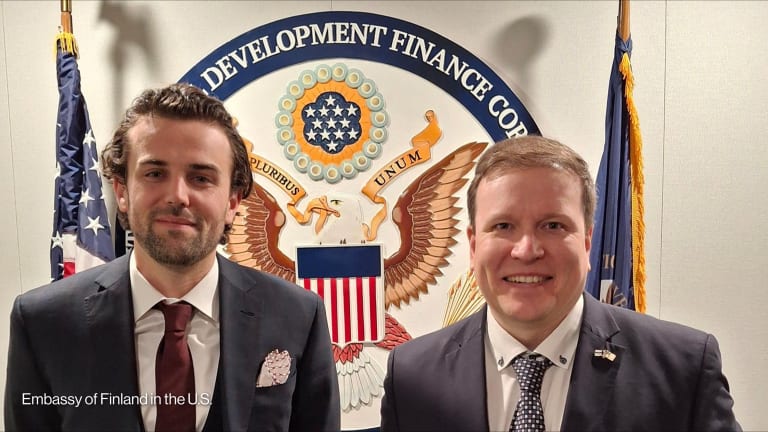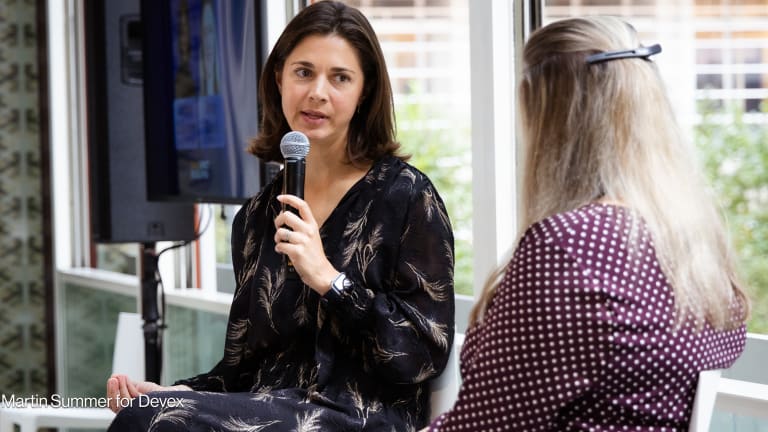Q&A: How stock exchanges can help finance the SDGs
Devex speaks with Nicky Newton-King, CEO at the Johannesburg Stock Exchange, to learn how exchanges can help mobilize capital for the SDGs and their role in development finance.
WASHINGTON — Capital markets have multiple ways to influence how financial systems can direct more funding to development: raising capital around certain issues, creating listing requirements, and using their voice to raise issues, which is often underrecognized, said Nicky Newton-King, the CEO at the Johannesburg Stock Exchange. “In exchange, for instance, we run the capital markets, but the voice that we have in doing that is much more powerful than actually the size of the exchange,” she told Devex. “Putting some responsibility on leadership of the various different types of institutions beyond just their economic contribution … is something that I think people don't really spend enough time concentrating on. If they use their voice and understanding and muscle in their industry in a particular way, that could make a difference.” JSE has had sustainability initiatives for years and policies aimed at environmental sustainability, gender equity, and diversity. Devex spoke with Newton-King to learn how exchanges can help mobilize capital for the Sustainable Development Goals and the role they can play in development finance. The conversation has been edited for length and clarity. What do you see as the role of capital markets, and exchanges specifically, in financing development and helping achieve the SDGs? The way I think exchanges can operate in this space is to look at developing products like green bonds as an example, blue bonds if you’re trying to deal with something in the ocean economy, even gender-based ETFs [exchange-traded funds] and the like in order to raise capital to make investments in relation to a specific development goal. So there’s clearly a capital raising aspect to it. But there's also in relation to exchanges … a leading voice role that you can play and a regulatory role that you can play. “A wholesale reengineering of financial systems across the world, I think is not going to happen. But I think you can make a massive difference by deploying the right carrots and sticks.” --— Nicky Newton-King, CEO, Johannesburg Stock Exchange Exchanges sit at the center of the financial market ecosystem. If we say something should matter, people sit up and notice in a way that is perhaps a different voice to when a bank or an investor says something should matter to people. There's a change-agent role an exchange can play. You can create listing requirements that say “we expect you to have a policy,” around something as simple as gender diversity at the board. Not that we set your requirements as to what that diversity should be, but we require you, the board, to have a policy, to publish that policy and publish how you perform against that policy every year. Then that puts your stakeholders in a position to engage with you. In that continuum of a capital raising space, which is a traditional space for an exchange, to a regulator, like we said listings requirements, to a change agent, like in raising the topic in the first place, I think there's a big role that an entity like an exchange can play in the capital markets and that capital markets themselves, capital market players themselves, can play. U.N. Secretary-General António Guterres recently said that if existing financial markets don’t change, then financing will fall short of what is necessary to achieve the SDGs. Do you think financial markets will change? You're not going to wholesale change a capital market system, or, for that matter, that capitalistic ethos, just by saying we want to change. Just like we may be converts to the need for change, there are a whole lot of people for whom this is not a given. You do have to employ a balance of carrots and sticks and there may be certain things that are better suited for a more gentle approach than others. There are many ways to achieve the same goal, but the speed with which you do it does depend on the leadership. Sometimes it’s national leadership, sometimes it’s corporate leadership, and sometimes it’s a regulators leadership. You could say, “we will never allow a company to list or remain listed unless 50% of its board are women.” You could take a view on that, but that is completely unrealistic because unless there were enough women available to sit on boards on every single company listed anywhere in the world, you’re actually never going to achieve that. So, how do you push people, and I don't mean nudge, how do you push people quicker than they might otherwise evolve into that space? You do that through this mix of carrots and sticks. A wholesale reengineering of financial systems across the world, I think is not going to happen. But I think you can make a massive difference by deploying the right carrots and sticks. A key part of the financing for development agenda is domestic resources mobilization, not just through efforts such as tax policy. What do you see as the role of local capital in helping finance the SDGs? There isn’t yet sufficient investor allocation of capital. This is not a South Africa thing, this is an around-the-world thing. “You’re not going to suddenly see, from one year to the next, masses move away from non-SDG focused investments towards SDG-focused investments, but you will start to see that movement.” --— Too much of the debate has been a little bit spun around if you’re going to invest in what used to be called ESG [environmental, social and governance]-driven issues then you’ve got to give up some of your alpha, some of your upside. Well, that's rubbish. As that debate is moving, I think you’re going to see more and more people start to reward companies that really do get their ESG responsibility, really do get their SDG responsibility, but that is a very slow move globally. So what makes a difference? I think things like the U.N. [Principles for Responsible Investment] that big institutional investors are required to apply their minds to before they invest their capital, making that really live as opposed to something they sign is important. A lot of people have signed it, but I don't know if they really live it yet. The move is going to happen gradually, you’re not going to suddenly see, from one year to the next, masses move away from non-SDG focused investments towards SDG-focused investments, but you will start to see that movement. And then over time, it will become something that people will say, “well obviously the responsible way to do business in a resource-constrained world ... whether it’s human capital, whether its economic or environmental capital requires you to behave differently,” but this is going to take years. There are criticisms that many of the frameworks used by financial systems are voluntary and so fall short of achieving their aims. How do you respond to those critiques? Companies choose whether to be in the public space or not. If you're going to use a stick rather than a carrot, then you really want to start to look at that at a national level and then roll that out at a more localized level. If you say, “it’s got to apply to listed companies,” for instance, I think you have to be very careful that you don’t inadvertently force them away from the public market space by which they avoid scrutiny altogether. I have a lot of sympathy for development agencies or for those that would say too much voluntary means it goes too slowly, but I think there are ways to do it that isn’t a total stick. I think stakeholders really need to assume some responsibility for engagement. If you are a stakeholder and you are concerned about a company in which you are investing, then you must take some responsibility for engaging with them if their behavior is something you find offensive. If, on the other hand, you are not a shareholder but you are a media person or you are a civil society organization, that transparency gives you the content with which you can then start to build an engagement agenda. How do you see the sector changing? How do emerging market exchanges compare to or influenced some of the bigger exchanges in the world? What you typically find in the sustainability, ESG space is that emerging market exchanges like ourselves, Brazil, Turkey, traditionally lead the way here. And that’s not very surprising really, it’s because there is such a big socioeconomic deficit. Therefore, business feels very strongly that it has a strong social license to operate and needs to step in quite carefully. So you often see those emerging market exchanges, those emerging market companies very involved in the socioeconomic issues of the place in which they're operating. You see this less in the likes of the U.S., etc., where the drive from a company's perspective is: “I have a legal license to operate and my first duty is to maximize profit to shareholders.” That just simply isn't the ethos in this country. If you're looking at interesting things, you start with the emerging markets — [and] what is exciting though is there is a very strong sense that this debate is being now [leaned] into across the globe.
WASHINGTON — Capital markets have multiple ways to influence how financial systems can direct more funding to development: raising capital around certain issues, creating listing requirements, and using their voice to raise issues, which is often underrecognized, said Nicky Newton-King, the CEO at the Johannesburg Stock Exchange.
“In exchange, for instance, we run the capital markets, but the voice that we have in doing that is much more powerful than actually the size of the exchange,” she told Devex.
“Putting some responsibility on leadership of the various different types of institutions beyond just their economic contribution … is something that I think people don't really spend enough time concentrating on. If they use their voice and understanding and muscle in their industry in a particular way, that could make a difference.”
This story is forDevex Promembers
Unlock this story now with a 15-day free trial of Devex Pro.
With a Devex Pro subscription you'll get access to deeper analysis and exclusive insights from our reporters and analysts.
Start my free trialRequest a group subscription Printing articles to share with others is a breach of our terms and conditions and copyright policy. Please use the sharing options on the left side of the article. Devex Pro members may share up to 10 articles per month using the Pro share tool ( ).
Adva Saldinger is a Senior Reporter at Devex where she covers development finance, as well as U.S. foreign aid policy. Adva explores the role the private sector and private capital play in development and authors the weekly Devex Invested newsletter bringing the latest news on the role of business and finance in addressing global challenges. A journalist with more than 10 years of experience, she has worked at several newspapers in the U.S. and lived in both Ghana and South Africa.








